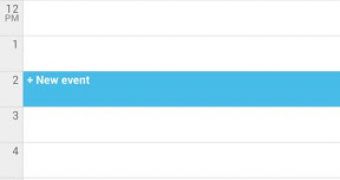Google Calendar is finally getting an official Android app. Most of Google's services have an app, either packed by default into Android, or at least available in the Play Store. Calendar wasn't one of them.
The default Calendar app for Android, the open source one, supports Google Calendar of course, via the API, so appointments and schedules could be synced.
But the functionality was limited, a full blown Google Calendar app should make it possible to add more specific features and improvements and see the additions in front of users faster.
The new Calendar app works with all of your existing calendars, the local one and whatever other calendar service you sync with, so you won't have to switch back and forth between two or more apps.
The Google Calendar app is a complete replacement for the default app built into Android.
The one big caveat though is that the new app, much like Google Chrome, only works on Ice Cream or Jelly Bean devices. Gingerbread users, which still means most Android users, are left out, again.
The new app comes with all the basics, adding, deleting, editing events, you also get notifications for invitations and you can respond to them.
But it also adds a few more, Google Calendar specific features, you can "snooze" an event from the notifications, without opening the app or respond to the notifications with short, predefined or custom messages such as "I'll be late."
There's also the ability to add a home time zone, to help you while traveling. Finally, the app now syncs past events from up to a year ago.
Google Calendar users weren't exactly missing out on anything without the official app and, while there is potential for better integration, the move seems to have more to do with Google's new Android strategy than the real need for an official Google Calendar app.
More and more companies are repurposing Android, slapping some ugly UI and a bunch of apps on top of it and calling it their own operating system.
Google's only defense against this are the official Google apps, which are not part of the open source Android. By having more official apps that are better or replace the open-source alternatives, Google's Android becomes more attractive. That's the strategy behind Google Chrome and behind the new Calendar app. At least, Chrome is vastly different and better than the default browser.

 14 DAY TRIAL //
14 DAY TRIAL //